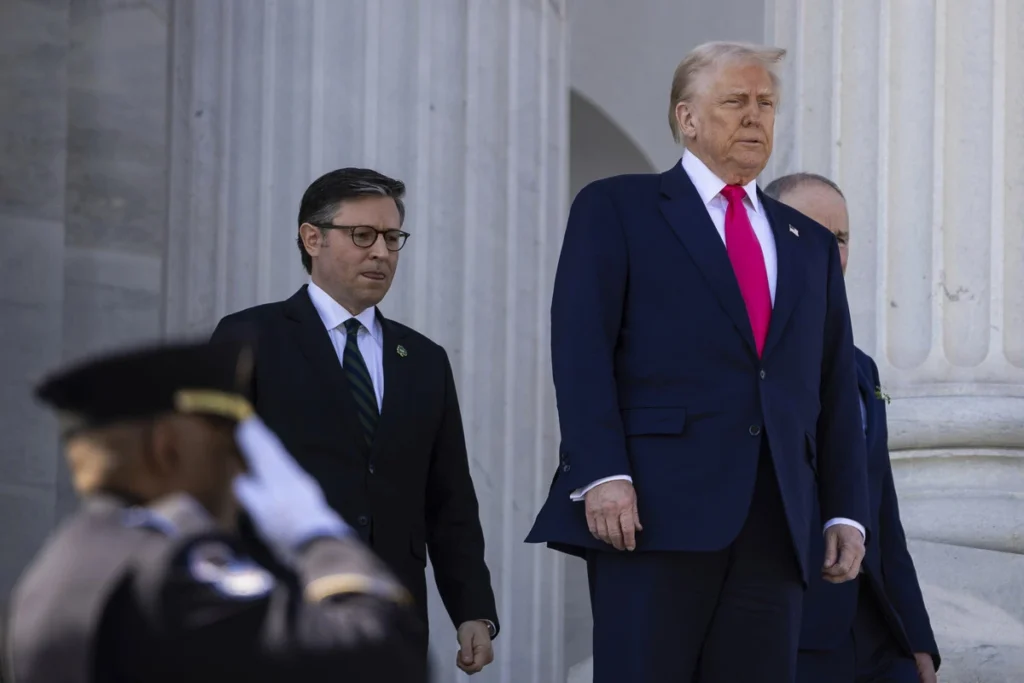In a significant political development on April 2, 2025, the U.S. Senate narrowly passed a resolution aimed at rescinding President Donald Trump tariffs on Canadian imports. The 51-48 vote saw four Republican senators—Susan Collins of Maine, Lisa Murkowski of Alaska, Mitch McConnell of Kentucky, and Rand Paul of Kentucky—break ranks with their party to join Democrats in opposing the tariffs.
Background on the Tariffs
President Trump had recently announced a series of sweeping tariffs, including a universal 10% tariff on all imported goods, effective April 5, and higher “reciprocal tariffs” targeting countries accused of unfair trade practices. Although Canada was exempted from the universal trump tariffs it faced specific levies of 25% on steel, aluminum, and automobile imports.
The Guardian
The administration justified these tariffs by citing national security concerns, particularly pointing to Canada’s alleged role in fentanyl smuggling into the United States. However, data indicates that the majority of fentanyl enters the U.S. through the southern border, leading many to question the validity of targeting Canada under this pretext.
Business.
Senate’s Bipartisan Response
The Senate’s resolution sought to terminate the national emergency declaration that President Trump tariffs on Canadian imports. Senator Tim Kaine, a Democrat from Virginia and the resolution’s sponsor, criticized the administration’s rationale, stating that labeling Canada as a national security threat was unjustified and detrimental to American families and businesses.
The four Republican senators who voted in favor of the resolution each expressed distinct concerns:
Business Insider
Senator Susan Collins emphasized the adverse effects on Maine’s industries, including lobstermen, blueberry growers, and potato farmers, highlighting that increased costs from tariffs would disproportionately impact those who can least afford them.
Senator Lisa Murkowski pointed to Alaska’s economic reliance on Canadian trade and the potential negative consequences for her state’s economy.
Senator Mitch McConnell underscored the potential harm to Kentucky’s industries, particularly the bourbon sector, which faced retaliatory tariffs from Canada.
Senator Rand Paul criticized the tariffs as economically harmful and warned that they could lead to a recession, arguing that such measures threaten the nation’s economic stability.

President Trump’s Reaction
President Trump responded strongly to the Senate’s action, particularly targeting the dissenting Republican senators. He took to social media to question their loyalty and accused them of aligning with Democrats to undermine his trade policies. trump tariffs defended the tariffs as essential for protecting American industries and addressing unfair trade practices by other nations.
Economic Implications and Expert Opinions
Economists have expressed concerns about the broader economic impact of the administration’s trump tariffs strategy. The newly announced tariffs are expected to increase consumer prices, disrupt supply chains, and potentially contract the economy. Specific sectors, such as the automotive industry, are anticipated to face significant challenges due to increased costs of imported components.
Furthermore, key trading partners, including Canada, Mexico, China, and the European Union, have announced retaliatory measures, imposing their own tariffs on American goods. This escalation has raised fears of a prolonged trade war, which could have far-reaching consequences for global trade dynamics and economic stability.
Political Ramifications
The Senate’s resolution, while largely symbolic due to the Republican-controlled House’s expected resistance and the President’s veto power, highlights growing divisions within the GOP regarding trade policy. It reflects a willingness among some Republicans to challenge the administration’s approach when it is perceived to conflict with their constituents’ economic interests.
This internal party dissent underscores the complex balancing act Republicans face in supporting the President’s agenda while also addressing the concerns of their local industries and economies. The upcoming midterm elections add another layer of complexity, as lawmakers must navigate their positions on trade in the context of voter sentiment and economic realities.
Conclusion
The recent Senate vote to block President Trump tariffs on Canadian imports marks a pivotal moment in U.S. trade policy and intra-party dynamics. The bipartisan nature of the resolution, with four Republican senators breaking ranks, signals significant concern over the economic implications of the administration tariff strategy. As the situation develops, the interplay between executive trade policies, legislative responses, and economic outcomes will be closely monitored by policymakers, industries, and international partners alike.

